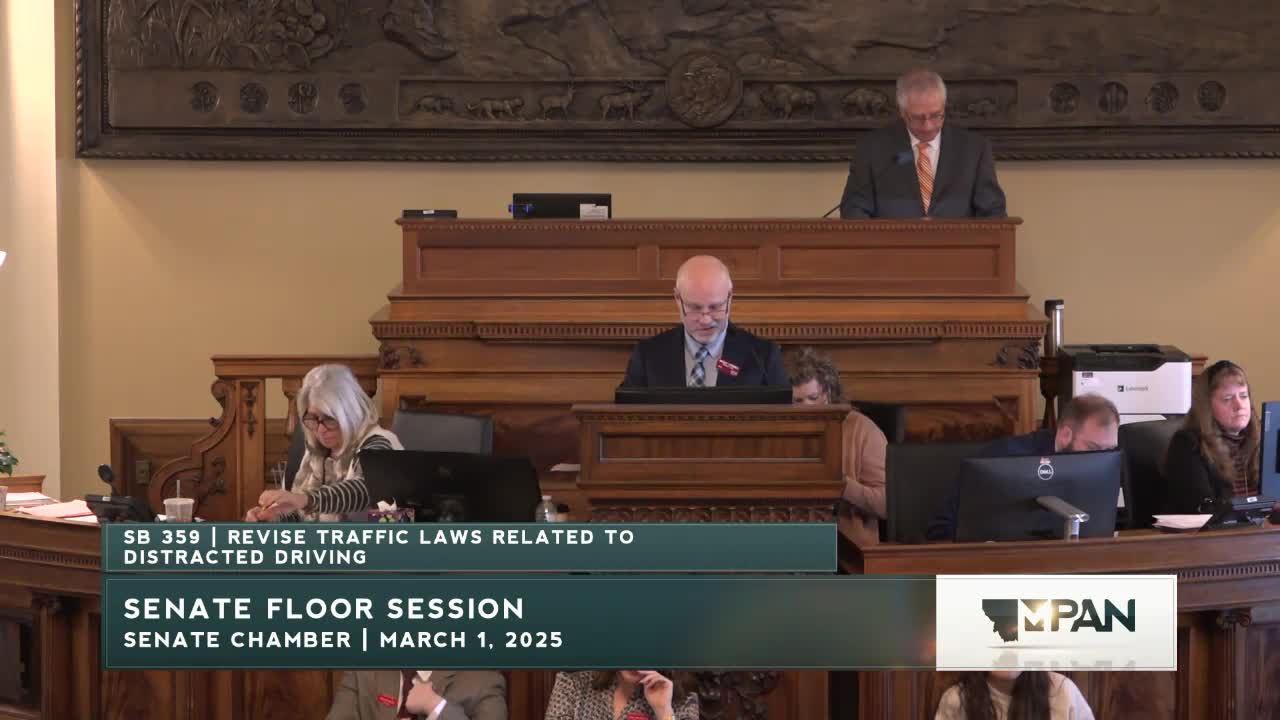Senate passes distracted‑driving measure ('Chloe's Law') after emotional floor debate
Get AI-powered insights, summaries, and transcripts
Subscribe
Summary
Senate Bill 359, a hands‑free distracted driving bill carried as ‘Chloe’s Law’ by Sen. Novak, passed second reading after an emotional floor debate that included victim testimony, law‑enforcement support and concerns about enforcement and civil liberties.
Senate Bill 359, sponsored by Sen. Jill Novak and often described in testimony as “Chloe’s Law,” passed second reading after floor debate that mixed personal testimony and technical questions about enforcement, exceptions and penalties.
What the bill would do: In broad terms the bill prohibits holding or using a handheld wireless communication device while operating a vehicle, requires hands‑free operation in most driving situations, and provides specified exceptions (law‑enforcement operations, emergency reporting, and other narrow categories). It also establishes civil penalties and identifies enforcement as a primary offense so a motorist can be stopped for an observed violation.
Why it matters: The measure addresses distracted driving — which lawmakers and safety advocates repeatedly described as a leading cause of crashes for younger drivers. Proponents said the bill provides law enforcement with a tool to deter unsafe phone use; opponents raised concerns about inconsistent enforcement, disproportionate impacts and numerous exceptions in the draft.
Floor highlights
- Sponsor’s account: Sen. Novak said she introduced the bill after the 2021 crash that killed a former student she taught; she described the bill as a safety measure and a deterrent, and said it had strong support from law enforcement and first responders at the committee hearing.
- Enforcement and exceptions: Several senators asked detailed questions about exceptions for law enforcement, emergency responders, in‑vehicle embedded screens, and autonomous or partially autonomous vehicles. Novak and other supporters said the bill is narrowly tailored for handheld devices and is not intended to impede legitimate emergency operations.
- Penalties and fairness: Opponents questioned the size of the penalties and noted uneven enforcement risk; proponents emphasized the bill is intended to protect life and provide a measurable tool for officers.
Floor actions and outcome
- Motion to recommend passage — Senate Bill 359 passed second reading on a recorded vote of 33 ayes and 17 nays.
Representative quotations (floor transcript):
- Sen. Novak (sponsor): “It is about education and prevention while providing law enforcement a tool that addresses concerns that they have.”
- Opponents raised enforcement concerns including disparate enforcement and the bill’s exceptions; one senator said the measure could create a “policing for profit” dynamic if local governments used enforcement to generate revenue.
Next steps: The bill will be eligible for third reading; sponsors and opponents may continue to negotiate language about exceptions for embedded vehicle systems and for emergency responders.
Context: Novak noted Montana is one of the last states without a statewide hands‑free statute; the bill’s proponents included law‑enforcement organizations and Montana Department of Transportation safety staff at the committee hearing.
